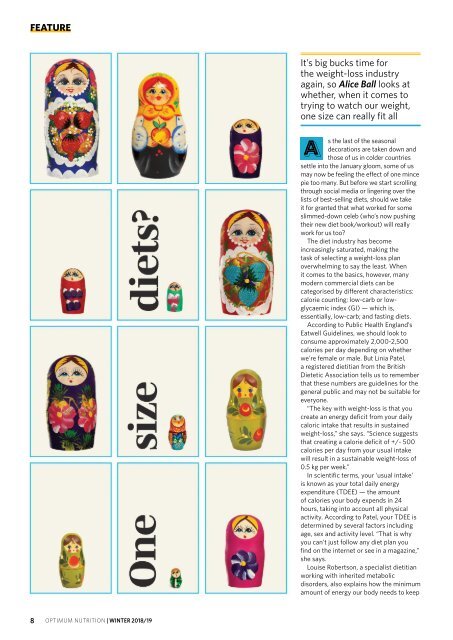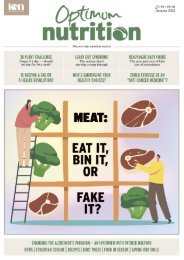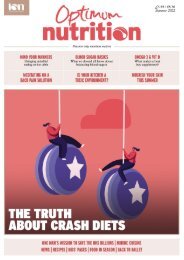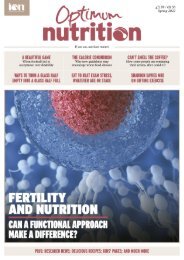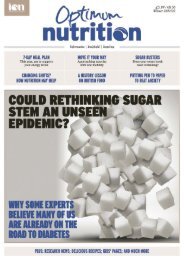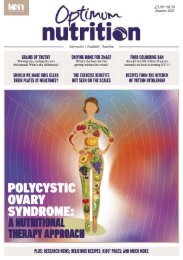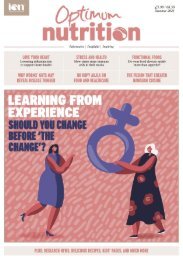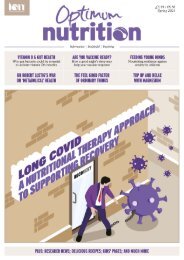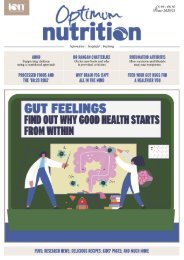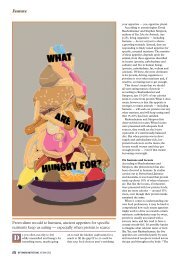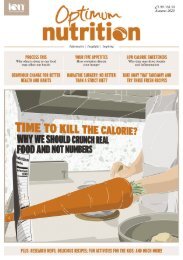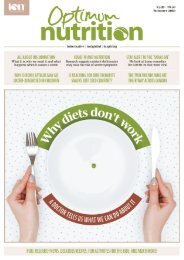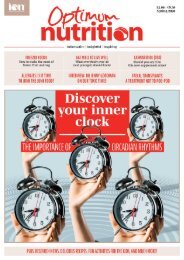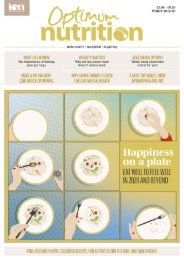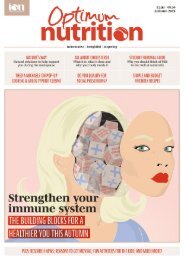One size diets
It’s big bucks time for the weight-loss industry again, so Alice Ball looks at whether, when it comes to trying to watch our weight, one size can really fit all
It’s big bucks time for the weight-loss industry again, so Alice Ball looks at whether, when it comes to trying to watch our weight, one size can really fit all
Create successful ePaper yourself
Turn your PDF publications into a flip-book with our unique Google optimized e-Paper software.
FEATURE<br />
It’s big bucks time for<br />
the weight-loss industry<br />
again, so Alice Ball looks at<br />
whether, when it comes to<br />
trying to watch our weight,<br />
one <strong>size</strong> can really fit all<br />
A<br />
s the last of the seasonal<br />
decorations are taken down and<br />
those of us in colder countries<br />
settle into the January gloom, some of us<br />
may now be feeling the effect of one mince<br />
pie too many. But before we start scrolling<br />
through social media or lingering over the<br />
lists of best-selling <strong>diets</strong>, should we take<br />
it for granted that what worked for some<br />
slimmed-down celeb (who’s now pushing<br />
their new diet book/workout) will really<br />
work for us too?<br />
The diet industry has become<br />
increasingly saturated, making the<br />
task of selecting a weight-loss plan<br />
overwhelming to say the least. When<br />
it comes to the basics, however, many<br />
modern commercial <strong>diets</strong> can be<br />
categorised by different characteristics:<br />
calorie counting; low-carb or lowglycaemic<br />
index (GI) — which is,<br />
essentially, low-carb; and fasting <strong>diets</strong>.<br />
According to Public Health England’s<br />
Eatwell Guidelines, we should look to<br />
consume approximately 2,000-2,500<br />
calories per day depending on whether<br />
we’re female or male. But Linia Patel,<br />
a registered dietitian from the British<br />
Dietetic Association tells us to remember<br />
that these numbers are guidelines for the<br />
general public and may not be suitable for<br />
everyone.<br />
“The key with weight-loss is that you<br />
create an energy deficit from your daily<br />
caloric intake that results in sustained<br />
weight-loss,” she says. “Science suggests<br />
that creating a calorie deficit of +/- 500<br />
calories per day from your usual intake<br />
will result in a sustainable weight-loss of<br />
0.5 kg per week.”<br />
In scientific terms, your ‘usual intake’<br />
is known as your total daily energy<br />
expenditure (TDEE) — the amount<br />
of calories your body expends in 24<br />
hours, taking into account all physical<br />
activity. According to Patel, your TDEE is<br />
determined by several factors including<br />
age, sex and activity level. “That is why<br />
you can’t just follow any diet plan you<br />
find on the internet or see in a magazine,”<br />
she says.<br />
Louise Robertson, a specialist dietitian<br />
working with inherited metabolic<br />
disorders, also explains how the minimum<br />
amount of energy our body needs to keep<br />
8 OPTIMUM NUTRITION | WINTER 2018/19
FEATURE<br />
us alive decreases with age. “Muscle is<br />
more metabolically active than fat tissues<br />
and requires more energy,” she says. “As<br />
we age, we tend to lose muscle mass and<br />
increase our fat mass. If you lose muscle<br />
mass, then your body will require less<br />
energy. Therefore, if you continue to eat<br />
the same amount as you age, you will<br />
gain weight.” Robertson also says that<br />
people who are physically active burn<br />
more calories throughout the day, so<br />
need to eat more to maintain their body<br />
weight.<br />
Metabolic disorders and lifestyle<br />
We might assume that once we’ve<br />
calculated our usual intake that we can<br />
plug the numbers into any weight-loss<br />
strategy. Wrong — this is where lifestyle<br />
factors and even disease factors come in.<br />
“Some people will find that cutting<br />
carbs down is an easy way to help with<br />
weight-loss and it may be beneficial for<br />
people with or at risk of developing type 2<br />
diabetes,” says Robertson.<br />
“On the other hand, a low-carb,<br />
high-protein diet could be dangerous for<br />
certain rare metabolic disorders such<br />
as urea cycle disorder. In people with<br />
this disorder, the body cannot get rid of<br />
ammonia from protein breakdown, so the<br />
build-up of toxic ammonia can lead to<br />
coma and death.”<br />
Likewise, Robertson says that fasting<br />
<strong>diets</strong> work well for people who are<br />
motivated to undertake the fast days but<br />
aren’t suitable for shift workers or people<br />
with certain health conditions.<br />
“It wouldn’t be recommended for<br />
people that need to keep their calorie<br />
intake stable such as people with<br />
diabetes on regular insulin, pregnant<br />
ladies, or people who have a history of<br />
eating disorders.”<br />
Being balanced<br />
It is equally important that whatever diet<br />
you follow provides adequate levels of<br />
essential nutrients. Low-carb <strong>diets</strong> often<br />
limit intake of wholegrains, carbohydratedense<br />
fruits and starchy vegetables — all<br />
key sources of fibre which is essential<br />
in maintaining bowel movement and<br />
digestion. So it is important to ensure<br />
intake of fibre from vegetables and fruits<br />
such as berries, which are low in sugar.<br />
Diets high in protein have also been<br />
linked to an increased risk of certain<br />
cancers, including cancer of the breast<br />
and colon; although it is important to bear<br />
in mind that overall diet and lifestyle are<br />
also important factors.<br />
It’s in your genes<br />
Life can seem very unfair if you have a<br />
“As we age, we tend to lose<br />
muscle and increase our fat<br />
mass. If you lose muscle mass,<br />
then your body will require less<br />
energy...”<br />
friend who is the proverbial dustbin and<br />
yet you only have to look at a slice of<br />
bread to feel your waistline expanding.<br />
So it may be some small comfort to<br />
know that research has revealed that our<br />
genetics can play an important role in<br />
how we respond to certain foods.<br />
Dr Giles Yeo, a geneticist at the<br />
University of Cambridge and a regular<br />
presenter on the BBC series Trust Me I’m<br />
a Doctor, has spent 20 years studying<br />
severe obesity and identifying the role of<br />
genetics in controlling food intake.<br />
Yeo explains that the brain needs to<br />
sense two signals to control what we eat.<br />
“First, it needs to know how much fat<br />
you have because this determines how<br />
long you’ll last without food in the wild,”<br />
he says. “Then, it needs to know what<br />
you have just eaten and what you are<br />
currently eating — these are short-term<br />
signals that come from the gut.”<br />
Both your fat and gut do this by<br />
releasing hormones which your brain<br />
interprets to control your food intake.<br />
People who are severely obese have<br />
genetic mutations in the fat-signalling<br />
hormone known as leptin.<br />
“What happens is the brain thinks<br />
these people have either no fat at all<br />
or the mutation makes the brain less<br />
sensitive to signals from fat and the gut,”<br />
Yeo explains. “As a result, the brain thinks<br />
‘I didn’t eat enough today’, making you<br />
eat more and therefore causing you to<br />
gain weight.”<br />
But how can research into severe<br />
obesity help people who are just slightly<br />
overweight?<br />
“Rather than being broken, the<br />
pathways in some people are slightly less<br />
sensitive to signals coming from fat and<br />
the gut,” says Yeo. “If you have someone<br />
who’s feeling five per cent hungrier all the<br />
time, they’ll end up eating five per cent<br />
more all the time and then they’ll gain<br />
weight.”<br />
The “million-dollar question” according<br />
to Yeo, is how we can use this research<br />
to change the way we approach weightloss.<br />
“There’s never going to be a one <strong>size</strong><br />
fits all approach because those of us who<br />
are overweight or obese have got to this<br />
place for very different reasons,” he says.<br />
“You could have people who eat more<br />
because they’re emotional eaters; some<br />
people who eat when they’re stressed —<br />
or some people who don’t; and some who<br />
have a more sensitive reward element to<br />
the brain and get a bigger high from food.”<br />
So understanding our own behaviour<br />
and motivation around food is important<br />
if we want to find solutions to overeating.<br />
“We first need to understand our<br />
personal biology and behaviour around<br />
food before we can select the right<br />
strategy for weight-loss,” says Yeo. This<br />
could be as simple as identifying the<br />
types of food that we crave most and<br />
removing them from our environments.<br />
Yeo hopes that in the near future,<br />
GPs will be able to carry out gene<br />
tests to create personalised diet plans<br />
for patients, based on the balance of<br />
macronutrients their body responds to<br />
best.<br />
Traditional approaches<br />
Yet the concept of individualised eating<br />
has been around for probably longer than<br />
we think.<br />
Originating in ancient India, Ayurveda is<br />
a traditional system of medicine that deals<br />
with wellness and longevity. It is founded<br />
on the idea that each of us has a unique<br />
combination of three ‘doshas’ — energies<br />
that describe everything in and around us.<br />
Dr Anil Alexander, a qualified Ayurvedic<br />
doctor practising in London, explains that<br />
our makeup of doshas determines our<br />
mind-body type — known as our ‘prakriti’.<br />
“Doshas are physical entities<br />
responsible for the functionalities that<br />
regulate all physiological, psychological<br />
and spiritual facets of a person,” he says.<br />
“There are three types: vata, pitta and<br />
kapha.”<br />
According to Alexander, we are at<br />
our best health when our doshas are<br />
in perfect order, and this is affected by<br />
what we eat. “There are four properties<br />
in every food which determine whether<br />
that food will augment or pacify our<br />
doshas. These are rasa (taste), virya (hot<br />
or cold), vipaka (result of digestion) and<br />
prabhava (action).” Someone who is<br />
predominately pitta, for example, would<br />
benefit from consuming cool foods with<br />
sweet and bitter tastes, while someone<br />
who is predominately vata will thrive on<br />
warm, moist foods that are sour and salty<br />
in flavour.<br />
But Ayurveda is not the only medicinal<br />
system that favours a personalised<br />
approach to diet. In Japan, blood group is<br />
considered to be important in determining<br />
health and even personality; an approach<br />
that was popularised in Eat Right For<br />
Your Blood Type by Dr Peter D’Adamo, a<br />
naturopathic physician and director of<br />
WINTER 2018/19 | OPTIMUM NUTRITION<br />
9
FEATURE<br />
Physiological differences in<br />
how we approach weight-loss<br />
have also been hypothesised<br />
for many years. The concept<br />
of ‘body type’ was first<br />
introduced in the 1940s by<br />
psychologist William Sheldon<br />
LOW-CARB<br />
Because protein and fat break down more<br />
slowly, a low-carb diet can be effective<br />
for weight-loss because the longer food<br />
takes to digest, the further down the<br />
gut it travels and the fuller you’ll feel.<br />
Carbohydrates are quickest to digest,<br />
followed by fats and lastly by protein. This<br />
is why protein and fat should make you<br />
feel full for longer, which can help reduce<br />
overall caloric intake, resulting in weightloss<br />
— although excess calories from fat<br />
and protein will also lead to weight-gain!<br />
However, low-carb <strong>diets</strong> are not suitable<br />
for all. Recently, it was reported that Anna<br />
Boniface, 2017’s London Marathon’s<br />
fastest amateur female runner, was<br />
diagnosed with a condition called relative<br />
energy deficiency in sport (Red-S) as<br />
a result of restricting foods such as<br />
carbohydrates to lose weight before<br />
races. Red-S can cause a range of health<br />
problems, including loss of bone density.<br />
Registered nutritional therapist Kate<br />
Delmar-Morgan says that someone who<br />
is training for a sporting event may need<br />
the additional carbs. She also would not<br />
recommend a low-carb diet for children,<br />
teenagers, anyone who is pregnant or<br />
breastfeeding, or who is underweight.<br />
INTERMITTENT FASTING<br />
Fasting <strong>diets</strong> can work by limiting calories<br />
to a shorter time window or reducing<br />
calories on certain days. There have<br />
been claims that fasting can increase<br />
metabolism, but current research hasn’t<br />
demonstrated that alternate-day fasting<br />
regimens produce superior weight-loss<br />
in comparison to standard, continuous<br />
calorie restricted plans.¹<br />
Delmar-Morgan does not advise<br />
fasting for people with adrenal fatigue,<br />
diabetes or eating disorders, anyone who<br />
is underweight, or for children, teenagers,<br />
pregnant or breastfeeding women. She<br />
also cautions for anyone with a thyroid<br />
issue. If you are considering a fasting<br />
diet and have a medical condition, it is<br />
recommended to seek advice from a GP,<br />
registered nutritional therapist or dietitian.<br />
the Centre of Excellence in Generative<br />
Medicine at the University of Bridgeport.<br />
“Research dating back to the 1960s<br />
shows that there are fundamental<br />
differences in the way that blood types<br />
respond to certain dietary choices,” says<br />
D’Adamo.<br />
“All of the recommendations made by<br />
the blood type diet stem from research<br />
on the physiological differences between<br />
each blood type.”<br />
According to D’Adamo, depending on<br />
your type — A, B, AB or O — the cells in<br />
your digestive tract will bind and react<br />
to foods differently. He also suggests<br />
that there are fundamental differences<br />
in the quantity of intestinal enzymes and<br />
stomach acid present in each blood type.<br />
“Blood type O and B appear to derive<br />
significant benefit from <strong>diets</strong> including<br />
healthy fats and lean animal proteins<br />
because they have much higher levels of<br />
an intestinal enzyme called IAP (intestinal<br />
alkaline phosphatase),” he says. “This is a<br />
critical enzyme involved in the digestion<br />
of proteins and fats.”<br />
Evidence to support the concept of<br />
a blood group diet, however, is limited.<br />
Whilst research in the 1960s did<br />
indicate that different blood groups<br />
were associated with varying amounts<br />
of stomach acid,² a 2014 study from the<br />
University of Toronto concluded that<br />
the benefits of particular blood group<br />
eating patterns were independent of an<br />
individual’s ABO genotype.³<br />
Nevertheless, D’Adamo does agree that<br />
“personalised nutrition is critical” when<br />
it comes to dietary change. “Beyond the<br />
individual foods recommended, even<br />
the carbohydrate, protein and fat ratios<br />
along with lifestyle recommendations are<br />
completely different for everyone,” he<br />
says.<br />
Physiological differences in how we<br />
approach weight-loss have also been<br />
hypothesised for many years. The concept<br />
of ‘body type’ was first introduced in the<br />
1940s by psychologist William Sheldon.<br />
Called somatotypes, these are divided<br />
into three categories: mesomorphs,<br />
ectomorphs and endomorphs.<br />
Ectomorphs are described as people<br />
with a small frame and little body fat,<br />
who have problems gaining weight and<br />
muscle no matter what they eat or how<br />
they exercise. The mesomorph tends<br />
to have a medium frame and develops<br />
muscle easily, while the endomorph is<br />
characterised by higher body fat and less<br />
muscle — these individuals are thought<br />
to gain weight more easily than other<br />
somatotypes.<br />
It’s a theory that was investigated<br />
by researchers at the University of<br />
Novi Sad in Serbia, to discover whether<br />
there were somatotype differences<br />
between metabolically healthy nonobese<br />
and metabolically healthy obese<br />
individuals. 4 The team concluded that<br />
metabolically healthy non-obese women<br />
had significantly lower endomorphy<br />
and higher ectomorphy traits compared<br />
to metabolically healthy but obese<br />
women, who had higher values of<br />
ectomorphy; suggesting that some<br />
people are genetically and physiologically<br />
predisposed to gaining weight.<br />
So back to us; if the best-sellers list<br />
doesn’t have the answers to weight-loss,<br />
what does? <strong>One</strong> approach is to speak to<br />
a GP, registered nutritional therapist, or<br />
dietitian for advice on losing weight in a<br />
safe and sustainable way.<br />
And as there is no one <strong>size</strong> fits all way<br />
to successful dieting, if we do find that<br />
we are struggling with our weight, we<br />
shouldn’t compare ourselves with others<br />
who appear to maintain theirs without<br />
any effort at all — because what works<br />
for their biology may simply not work for<br />
yours. And there is no shame in that.<br />
References:<br />
1. Patterson R & Sears D (2017). Metabolic effects<br />
of intermittent fasting, Ann Rev of Nutr, 37:371-<br />
393.<br />
2. Johnson D et al (1964). Gastric ulcers, blood<br />
groups and acid secretion. Gut, 5(5) 402-11.<br />
3. Wang J et al (2014). ABO genotype, ‘bloodtype’<br />
diet and cardiometabolic risk factors.<br />
PloS <strong>One</strong>, 9(1), e84749. doi:10.1371/journal.<br />
pone.0084749.<br />
4. Galić et al (2016). Somatotype characteristics<br />
of normal-weight and obese women among<br />
different metabolic subtypes, Archives of<br />
Endocrin and Metab, 60(1), 60-65.<br />
10 OPTIMUM NUTRITION | WINTER 2018/19
Enjoyed reading this<br />
preview?<br />
Subscribe and read the full digital magazine for FREE.<br />
Subscribe


